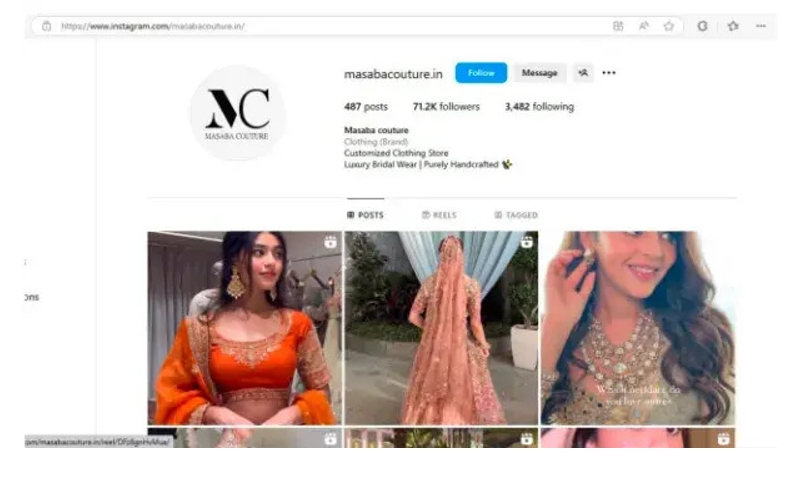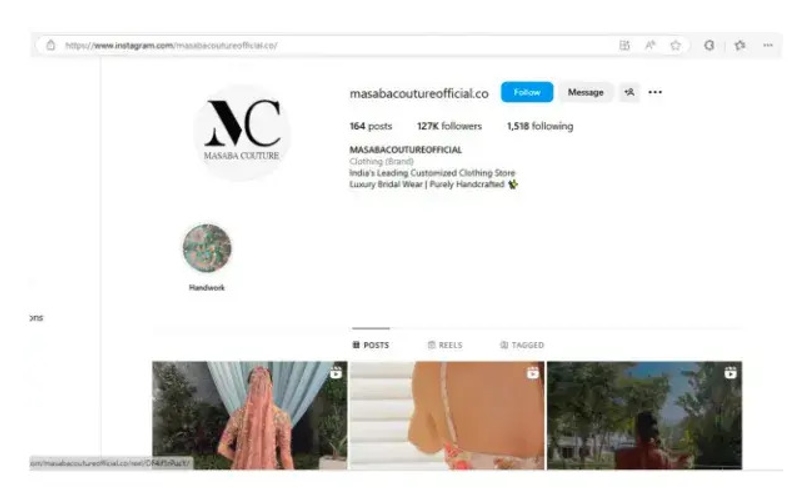- in European Union
- with readers working within the Business & Consumer Services industries
- within Environment, Litigation, Mediation & Arbitration and Technology topic(s)
- with Inhouse Counsel
- in European Union
Introduction
Masaba Gupta has long been celebrated for her distinctive, fearless and unconventional Fashion. Through House of Masabam, Masaba Gupta not only built just any other fashion label, but a powerful brand identity that blends cultural with modern contemporary expression.
But when creativity becomes commerce, brand protection becomes important. In a recent legal development in the case of House of Masaba Lifestyle (P) Ltd. v. Masabacoutureoffcial.co., [CS(COMM) 143/2025] the Hon'ble Delhi High Court restrained Masaba Couture Official (Defendant) from using the trademark "MASABA" for the identical goods and services as that of the Plaintiff i.e., retail of apparels & accessories for men and women.
Appellant's grounds:
In this case, the Plaintiff, i.e., House of Masaba, was founded
by Masaba Gupta in 2009. The Plaintiff is engaged in the business
of bridal lehengas, jewellery, sarees, gowns etc., and also
hasregistrations for the trademark  and
and  in different classes. The details of the same
are pasted below:
in different classes. The details of the same
are pasted below:
classes. The details of the same are pasted below:
|
Sl.No |
Application Number |
Mark |
Class |
Date of Registration |
Status |
|---|---|---|---|---|---|
|
1. |
2088689 |
 |
25 |
January 24, 2011 |
Registered |
|
2. |
4792088 |
 |
24 |
December 23, 2020 |
Registered |
|
3. |
4792087 |
 |
18 |
December 23, 2020 |
Registered |
|
4. |
4792089 |
 |
14 |
December 23, 2020 |
Registered |
|
5. |
4742499 |
 |
3 |
November 12, 2020 |
Registered |
The Plaintiff contended that given the widespread use of the
trademarks "MASABA"/ "House ofMasaba" and  by the Plaintiff for the sale, promotional
and advertising activities, Plaintiff's brand has become a
single source identifier of its goods and services and hence have
exclusive rights over the trademark MASABA.The Plaintiff alleged
that the Defendants "masabacoutureofficial.co" and
"masabacouture.in", were using impugned marks
"MASABA"/ "MASABA COUTURE"
by the Plaintiff for the sale, promotional
and advertising activities, Plaintiff's brand has become a
single source identifier of its goods and services and hence have
exclusive rights over the trademark MASABA.The Plaintiff alleged
that the Defendants "masabacoutureofficial.co" and
"masabacouture.in", were using impugned marks
"MASABA"/ "MASABA COUTURE"  for selling identical goods and services and
were also using it on their social media handles. The screenshots
of the alleged use on social media are pasted below:
for selling identical goods and services and
were also using it on their social media handles. The screenshots
of the alleged use on social media are pasted below:


Aggrieved by the actions of the Defendants, the Plaintiff instituted a suit for trademark infringement, alleging mala fide and dishonest use of the mark. The Plaintiff contended that the Defendants had deliberately adopted and used the impugned trademarks with the intent to mislead consumers and create a false association with the Plaintiff's brand. Such use, it was argued, was not only deceptive but also detrimental to the distinctive character and goodwill of the Plaintiff's registered trademark, "MASABA."
Court's Ruling
The Hon'ble High Court of Delhi held that the Plaintiff made a prima facie case in its favour and refrained the Defendants from "using the impugned trademarks "MASABA"/ "MASABA COUTURE"/ and Instagram handles – "masabacoutureofficial.co" and "masabacouture.in" or any other trademark/trade name as may be identical to or is deceptively similar to the plaintiff's registered trademarks"
Furthermore, the Hon'ble Court directed "Instagram" on whose platform the Impugned pages of the Defendants are available, to take down such pages and provide the complete contact details of the Defendants available with them to the Plaintiff.
Conclusion
The House of Masaba case serves as a timely reminder that in the fashion industry, where personal identity often becomes brand identity, early and strategic protection of trademarks is critical. Designers must not only register their core marks including names, logos, and sub-labels but also ensure consistent usage across all consumer touchpoints to strengthen their distinctiveness.
How IP is becoming vulnerable on social media platforms?
Regular monitoring of digital platforms and marketplaces is essential to detect unauthorised use at an early stage. Importantly, swift legal action such as seeking interim injunctions can prevent infringers from establishing false goodwill.
The Court's direction to Instagram also highlights the growing role of intermediaries in enforcing IP rights online, reinforcing the need for brands to understand and leverage platform-based grievance mechanisms. Ultimately, legal enforcement must go hand-in-hand with clear brand communication and consumer awareness to protect the authenticity and commercial value of creative ventures.
With the explosion of digital marketing and the dominance of e-commerce and social media platforms, brands today are more visible and vulnerable than ever before. As businesses leverage online channels for maximum reach and engagement, their logos, taglines, aesthetics are being widely disseminated across digital ecosystems. While the e-world brings marketing and business opportunities for brands and help them build reputation it also creates a fertile ground for impersonators and copycats to copy and misuse brand assets, especially on platforms with high user-generated content like Instagram, Facebook, and online marketplaces.
Brand impersonation, lookalike product listings, counterfeit goods, and deceptive advertising have sadly become the new normal that businesses face in daily. These infringements not only dilute brand value and goodwill but also deceive consumers and cause irreparable damage to brand image and reputation.
Intermediary Liabilities and IP
Regular online monitoring and swift takedowns have become indispensable. Brands must be prepared to act fast by invoking legal remedies such as interim injunctions to halt misuse before the infringer gains traction or builds false goodwill.
Under Rule 3 (1) (b) (iv) of India's Information Technology (Intermediary Guidelines and Digital Media Ethics Code) Rules, 2021,1 Intermediary shall inform the user of its computer resource not to host, display, upload, modify, publish, transmit, store, update or share any information that infringes any patent, trademark, copyright or other proprietary rights.
Under Rule 3(2) intermediaries are required to publish grievance redressal mechanisms, respond to complaints, and take down unlawful content upon receiving actual knowledge or court orders.
However, Section 79 of the IT Act, 2000 provides for an Exemption from liability of an intermediary in certain cases and grants Safe Harbor to intermediaries from liability for third-party content, provided they
- Do not initiate Transmission
- Do not select the receiver
- Do not modify the information
- Observes due diligence while discharging his duties
The exemptions do not apply if
- Intermediary has conspired or abetted or aided or induced, whether by threats or promise or otherwise, in the commission of the unlawful act.
- Upon receiving actual knowledge intermediary fails to expeditiously remove or disable access to that material on that resource without vitiating the evidence in any manner.
This legal balancing act makes it essential for brand owners to file detailed, platform-specific complaints and to understand the thresholds that trigger intermediary responsibility.
Ultimately, legal enforcement alone is not enough. It must be accompanied by clear brand communication, consumer education, and active presence across digital platforms to build authentic engagement. When brands proactively reinforce their identity and legitimacy, they reduce the risk of consumer confusion and make it harder for counterfeiters to operate undetected.
Footnote
For further information please contact at S.S Rana & Co. email: info@ssrana.in or call at (+91- 11 4012 3000). Our website can be accessed at www.ssrana.in
The content of this article is intended to provide a general guide to the subject matter. Specialist advice should be sought about your specific circumstances.
[View Source]

